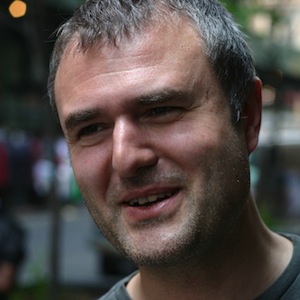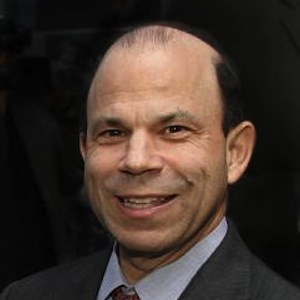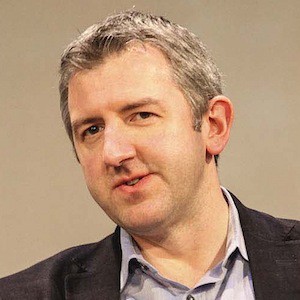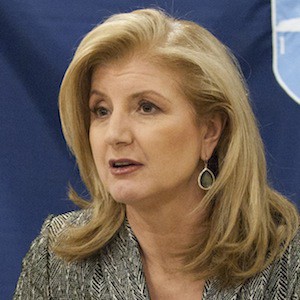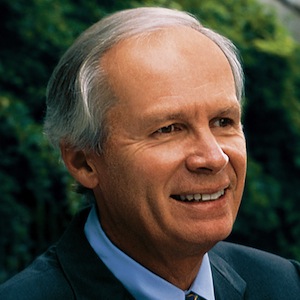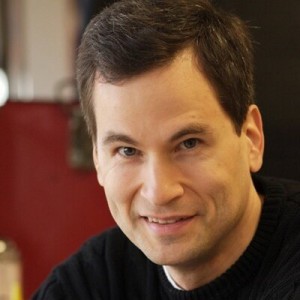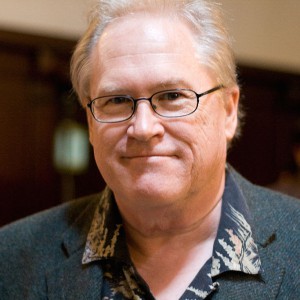Martin: March 14th, 2013. New York City, Nick Denton. Hello.
Nick Denton: Hi.
Martin: As I was saying before, one of the very interesting things about interviewing you for this project is that you kind of straddle both worlds. One of the few people who do successfully. Could you begin, actually, with your career at “The FT,” and just talk a little bit about that, and kind of when you first hit the electronic side? I think you were a print journalist for a while, right? Yeah.
Nick: I was always a geek. When I was based at The FT in Budapest, I used to get on a little train in Vienna which was the closest place you could buy “Wired Magazine,” and all the Mac enthusiast magazines. I used to go once a month to Vienna to pick up that, and eat sushi. Do the other things that you could do in the developed West.
I always had a leaning towards technology. In ’96 switched from the investment banking beat to the tech and Internet beat. I had to step off staff in order to, Because I wanted to go to San Francisco. I’d read “Wired Magazine.” I believed that something was happening there and was actually a little bit disappointing when I arrived.
It wasn’t quite what I’d imagined, that South Park, I’d imagined this digital epicenter where the new web was being born. It actually seemed to be inhabited by a few homeless people, and maybe two or three people who could have conceivably been web designers, but I still believed. I closed my mind to the visual evidence.
Martin: So you left The FT and were you still working for [crosstalk] ?
Nick: I was still working for The FT. My final piece for the The FT was a story about…
Paul: I noticed this table jerks, so you guys should not lean on the table, but I needed to tell you that.
Martin: Yeah, that’s OK.
Nick: My last story for The FT was profile of a company called LinkExchange. Ali Partovi and Tony Hsieh. They actually had LinkExchange and they had DrinkExchange, both of which I ended up emulating. LinkExchange with a company called Moreover, which packaged up news links and had as the idea, kind of a link paper click economy around news links. DrinkExchange, I did a company called First Tuesday, more or less in parallel.
Martin: We’ll get into that in a minute.
Nick: I basically stole their lives. My last piece for The FT was a profile of the founders of LinkExchange. Which ended with, “…and this looks like way too much fun so I’m out of here.” [laughs]
Martin: Then you start Moreover right after that?
Nick: I started Moreover and First Tuesday sort of not immediately after, it was messy. You have to find yourself the right partners. I had actually also before leaving The FT, Richard Lambert who was the editor at The FT at the time, asked me when I was in San Francisco to tell us what we should be doing. I wrote a memo which unfortunately I’ve lost.
Martin: That’s such a shame.
Nick: I wrote this memo which said it is pointless for us to report what others had done better. We should be seeking to add value and where others have done a story better, we should link to them. This was…
Martin: Heresy.
Nick: It was heresy. It was revolutionary. Unfortunately, it was still sort of revolutionary in the newspaper world 10 years later. That was the extraordinary thing. The extraordinary thing was not that it was revolutionary then. The extraordinary thing was that it was still revolutionary and still sort of now, even revolutionary. That newspapers insist on rehashing stories that have been better covered elsewhere, instead of taking and moving the story forward. There’s still a huge amount of duplication in the efforts of the news industry.
Martin: Moreover is what?
Nick: Moreover is a news search engine. A news search engine, which ended up getting diverted into enterprise information management. I think we call it dynamic information management. I was very proud of that phrase. Now, I’m totally ashamed of the fact that I was proud of that phrase. When the bottom fell out of the consumer Internet market, that seemed like the only option for survival. I ended up going to conferences with corporate librarians, and pitching this service as dynamic information management. The company was eventually sold to VeriSign, respectably.
Martin: What year was that?
Nick: It was sold to VeriSign after I’d left. It was sold to VeriSign in 2005.
Martin: Did you start Gawker before 2005? I just can’t remember.
Nick: My mother was sick, and died. I moved back to England to be with her, and, then, actually, just to be with my family. After that I was trying to decide between San Francisco, New York, London, and Budapest. I was rather lost somewhere between traditional journalism and the Internet, somewhere between those four cities, somewhere between media and technology.
Martin: But you did start Gawker. When?
Nick: I started Gawker as a side project. My most successful ventures have tended to be side projects.
Martin: I remember that you were writing, at the time. You didn’t like the dot com boom.
Nick: I didn’t like the dot com boom, probably, because, I’d been at the heart of it, in Europe. First Tuesday was about as “boomy” as you could possibly imagine. It started as a party. It was a boom party. It became an event series. Sponsors attached themselves to it. It made money, accidentally.
Martin: Just be careful what you say.
Nick: In a way that I was sort of ashamed of. I didn’t like having made money that way.
Martin: But, I remember that you started out, and you may still have this view, that what you were doing, when you started Gawker, was very, very modest. I just remember the modesty of it. That it wasn’t going to make a lot of money. That it wasn’t going to be a big business. I guess, because people had a sense that that’s what you were trying to build. Do you remember any of this?
Nick: The story goes a little bit further back.
Martin: I’m interested.
Nick: When I was in Silicon Valley, we reached out to people like David Winer. I wouldn’t say we were friends, but I knew David Winer. I did become quite friendly with the founders of Blogger, with Evan Williams and Meg Hourihan. Meg Hourihan who I ended up working with later. Evan Williams, who I was going to partner with, before he was acquired by Google. I was entranced by Blogger. Moreover had a joint venture with Blogger called Newsblogger, which was a combination of Moreover newsfeeds, and the Blogger platform. It was, actually, written by a guy called Matt Hamer, who currently still works for me, actually, out of Kansas City.
The idea of Newsblogger was that you would consume and write about the news at the same time. It was, actually, very much ahead of its time. It was something like what we’re doing now, in many ways. The act of reading and writing, in a truly interactive news environment, cannot be separated. They have been separated, but, they cannot be separated, not usefully separated.
We tried to buy Blogger. In fact, my excuse, at least, for resigning from Moreover, or saying that I was going to leave, and initiating a search for a new CEO, was because the board had overruled me on the acquisition of Blogger for $2 million. Which is again, it certainly sounds like a good story in retrospect. It’s a good narrative.
I also introduced Jeff Jarvis, who was then at Condé Nast. I introduced him to Evan Williams. When I was pitching Moreover to Condé Nast, Condé Nast ended up putting in $4 million. As a side benefit, they got introduced to Blogger, and ended up investing in Blogger which I think was one of their most successful Internet investments of that era.
I’d been involved in blogs sort of tangentially. After 9/11, I was politically more engaged than I had been before. I wouldn’t say I was…There was a breed of war bloggers. They called them war bloggers. People who started writing because they were moved by 9/11 or subsequent political discussions. They were moved to write.
I had a personal site on which I wrote about politics. Actually, I think most of it is actually off the Internet now. I should probably put it back on. There’s some embarrassing stuff about what we should do with Iraq. I think my idea was to partition the damn place, or send in the troops but don’t take Baghdad.
Martin: I think that’s what Joe Biden wanted to do and he’s about to run for President, so you’re not too far behind the times.
Nick: It’s very easy writing, it was very easy writing in that environment. It was basically as easy as writing features for The Financial Times had been hard. The more spontaneous, the quicker the turnaround, the speedier the feedback, the more I enjoyed writing. I wrote well. I wrote better than I had at The FT. That was an education for me that actually there was a certain kind of writer, maybe most writers, who work better in more conversational and interactive environment.
I setup Gawker as a side project. At the time, I was working on a thing which became called Kinja. Kinja’s the name of our new interactive news platform. We’ve recycled the name.
In fact, Matt Hamer, the guy who wrote the code for News Blogger worked on that project and is one of the key guys, one of the key developers on the new Kinja. I’ve been trying to do this forever.
Like most things, you have one big idea in your life and you just keep worrying away at that until you get it right.
Martin: We’ll get to the what the big idea is in a second, but what is…
Nick: Gawker and Gizmodo are side projects. I’d met Peter Rojas who then worked for the Red Herring. I’d met him I think actually probably was in San Francisco. Maybe it was New York. In fact it was at dinner at was it Steak Frites, which I think was a restaurant somewhere around Union Square, with Om Malik and Pete Rojas. We were discussing an idea which was, what if you just took Wired Magazine, the magazine that I used just to travel for Vienna for, has a section called Fetish Section, which is cool gadgets. Whenever I’d pickup the magazine, I would go straight to the fetish section.
What if you just put out the fetish section? What if you got rid of all the junk that surrounded it and you put out the content, the information, the news with the highest value and you did it instantly. You didn’t have to wait two months for the thing to be published, you didn’t have to travel to Vienna to get it. What if you just did that?
I hired Pete Rojas at then I guess $1,000 a month. I’d made some money off the sale of First Tuesday, $3,000 a month for Pete Rojas, another whatever it was, $2,000 a month I think for Elizabeth Spiers at the beginning. Then I put Pete Rojas up to $2,000 a month. So $4,000 a month even though there was no advertising at the time.
This was 2001, 2002. I thought I can fund that forever. I can fund that. People are still reading stuff on the Internet, sooner or later there’s going to be money there. I knew that.
Martin: But you must also have had a vision of what your…
Nick: No.
Martin: You did not?
Nick: No. In fact by then I was actually very distrustful of the very idea of vision, or plan, or anything. If something seems fun, if it seems interesting, do it. Don’t think too much about it. Don’t strategize too much. Just do it. Because I’d had more success…Moreover was a respectable exit. Moreover was my grand plan. Moreover was my theory. This thing was going to revolutionize news.
First Tuesday was an accidental company. It was a party that somehow became an events business which got bought for more money than should have been paid for it. I was skeptical about the ability of either my plans. I was skeptical of planning, generally. I’ve stayed that way.
Martin: This is very interesting. Do you think that’s like a break point or a distinction between traditional approaches to web journalism and…
Nick: No. That’s just me.
Martin: Just you. Let’s continue with this. You start Gawker and…
Nick: Gizmodo first.
Martin: Gizmodo first.
Nick: Gawker was 2002. I’d moved to New York in May, 2002. I’m working on this coding for a blog of all blogs, a blog aggregation service, which was then called Lafayette Project. But then it was later called Kinja when we launched it. The things that were successful, because the initial Gizmodo launch wasn’t that successful, didn’t get a huge amount of attention. But the initial Gawker launch did at the beginning of 2003.
It was some combination of maybe geographical concentration. It was a very kind of Manhattan sites, particularly there. It appealed to people who “The New York Times” was too general for them. For them, New York was downtown New York and maybe little bits of Brooklyn.
There’s a certain demographic, it was a certain part of the city and here was a site that appealed to a very specific group who are very well networked, who would talk amongst themselves. It was a very good place to start in many ways.
The site got buzz almost straightaway. Our launch party was maybe two or three months after we launched, Kurt Anderson came. I didn’t know Kurt Anderson. None of us were connected to him in any way, he was a figure. We’d all heard of him. He’d edited “Spy Magazine.” Gawker was, to some extent, the successor and [inaudible 17:20] to Spy Magazine. But that was a measure of how quickly the thing took off.
One of the reasons it took off, I think, was because there was nothing else going on at the time. They were all carpetbaggers, had been washed out of the market. There was no Internet advertising. The initial business model, to the extent that there was one, was that, “Maybe we can make some money off of [inaudible 17:43] fees.” That was the extent of it. Or otherwise, “I’ll just fund it for as long as it takes.”
It took off. When something takes off like that, you should just plunge straight in. I wouldn’t say I plunged straight in. In retrospect, I should have gone more aggressive sooner.
Martin: That was part of the humbleness that I was talking about before. There was no Internet advertising. I can remember you saying, “This is never going to be big.”
Nick: That was a result of two things. Firstly, I’d had the experience of a wildly over hyped start up in First Tuesday and in companies that I’d covered. But I’d felt it personally. First Tuesday didn’t get as much of the backlash as maybe it deserved. Because it was the frothiest bit of the froth, as far as companies go. We were seen, in the UK, as having ridden the hype. We’d got out, but I wasn’t the face. There was a woman. Generally, women tend to attract attention, both positive and negative. She got the worst of it, during the backlash. But I was close enough to that to know that was not a path I wanted to ever go down again. I knew that this was going to be a success. I knew I didn’t want to get any outside investment.
I knew I never wanted to have outside investors again. Why would one over-hype it? What’s the purpose? You’re just going to draw attention to it. You’re going to encourage competitors to come in. I’d come out with lines like, “Why are you so obsessed about the revenue model? Who cares about revenue models? In any case, these things make less money than a hamburger stand.”
That was one of my lines. Like, “Don’t look here.” That was later characterized as being Denton reverse spin. Eventually, they did think there was money in it, precisely because I was downplaying it so much. But in any case, it’s very hard for anybody to write a story about that. There’s just too many levels to unpack in a simple news piece.
Martin: Then, from Gizmodo and Gawker, you started to roll out some other brands. Infamously the Fleshbot website came. When was that?
Nick: Was that the third?
Martin: I thought it was.
Nick: It was early.
Martin: Is that still alive?
Nick: No, we sold. We didn’t sell it. I gave it to the editor. It was more trouble than it was worth.
Martin: Why did you just start it? I’m just curious?
Nick: I got a kick out of being a pornographer. It saved me from ever being tempted by respectability. Funny thing, people thought it was for money. [laughs] The story of my life or my business career is everybody thinks everything is for money. I’m practical. I have a working company. But it’s almost never been the primary motivation.
Martin: I assume a lot of the other chatter that was going on back then was, you’d created a kind of digital magazine model here. It’s not a magazine, in the sense that it’s anything like that. I don’t mean it in that way. But in terms of brands.
Nick: We did call them titles. I called myself a publisher and we saw Conde Nast as being…We’d like to be, for our demographic, as prestigious as Conde Nast. There was definitely an element of that.
Martin: There was chatter that they might come in and acquire you.
Nick: We got two acquisition feelers, ever. I got invited into MTV when Tom Freston was running it. It was Judy McGrath organized the…I was invited in to see her and then Tom Freston did a drop in. At some point, I realized, “This isn’t just a get to know you. Maybe there’s more interest.” I was trying to parlay that acquisition interest into… Maybe some partnership, let’s get to know each other. I can dangle the prospect of an acquisition which will never happen, in order to get them to do something for me. The only other time was Jeremy Phillips of News Corps, who is a friend of mine, pinged me the day after AOL bought Weblogs Inc. “Some bright spark here suggests that we should at least ask you.” But we don’t actually get any offers anymore.
Martin: Why do you think that is?
Nick: Maybe because there’s a poison pill, even if it’s not Fleshbot, which was my previous poison pill, that we take on too many vested interests. The big difference between Gawker and other media organizations is that we have, really, no sacred cows. There is no list. There are no protected people. That is rather uncomfortable for a lot of other proprietors.
Martin: I’m looking out into the newsroom. I’m seeing a screen with a lot of graphs on it. At some point, you must have realized that you could program these sites based on real time data, Chartbeat data, whatever it is that you’re using. I’m not sure. When did that happen? Or is that erroneous?
Nick: No. It started with Site Meter, which was used on every personal blog. That wasn’t unique to us. Anybody who set up a personal blog at the time tended to have Site Meter and anybody who had Site Meter became rapidly obsessed by Site Meter. “Where’s my traffic coming from? What’s the chart?” We had some of our early bloggers that put Site Meter up… It would be on their screen permanently. They were doing it themselves, naturally. I started paying people bonuses based on their Site Meter traffic.
Martin: When was that?
Nick: That was early. Might have been year one or year two. It seemed like a very natural way to do. Initially, it was $12 a post which worked out, for Spiers and Rojas, at about $2000 a month. I didn’t really want to pay them. They wanted more money, as these things started getting more successful. I didn’t want to pay them base, so I tied it to traffic. That’s more or less my recollection of it. Later on, I realized that the underlying dynamic, the tension within Gawker and probably within myself, is the tension between the initial editorial mission, which is let it all out, all of it, everything, and my competitive side. My desire to beat Jason Calacanis. That’s intentional. You do a story that gets the traffic.
Maybe in order to get the traffic you simplify the story a bit, you don’t tell the full, complicated truth.
Martin: He had developed Engadget just about at the same time.
Nick: What he did was he came in with a bang. Initially, he had a bunch of trade blogs. I wasn’t very worried about those. They seemed boring. Pete Rojas to whom I would not give equity because I wanted to maintain a coherent organization. I didn’t what to have separate bits of equity in separate titles. Pete Rojas wanted equity. I wouldn’t give him equity. Calacanis poached him. Engadget was Pete Rojas’…
Martin: Revenge. [laughs]
Nick: It was. Pete Rojas got equity. He owned half of Engadget which meant that Calacanis doomed himself, in the sense that he would never have a coherent company. But that was a price that he paid, in order to get a head start. Then he, quite quickly, launched in cars and video games. Did he launch before us in cars and video games? Maybe we launched.
Martin: Jalopnik?
Nick: Jalopnik and Kataku. But those sites were… If we didn’t launch immediately after him, it would have been in anticipation…
Martin: So you viewed him as your early competitor?
Nick: It was painful at the time. I was stuck in Brazil. I hear about this site called Engadget. I go on and it’s very much like Gizmodo. I look at Gizmodo and Pete Rojas was fulfilling his contractual obligations. It was brutal. It was a very effective move. Calacanis is the best competitor I’ve ever had, in terms of his willingness to do things that most people are too decent to do.
Martin: He develops this, but pretty quickly sells it to AOL. It’s not like he’s in the…
Nick: But not before he has got our juices going.
Martin: So that was good for you?
Nick: In retrospect, it was good. You never know whether these things are good or bad.
Martin: You want to stop for a second?
Paul: It’s saying that I should change files, so we don’t run out.
Martin: This is great.
Paul: Three, two, one.
Martin: Sorry.
Nick: Just to finish it off on Calacanis. At one point, Engadget had at CES…They’d sent six people down there. We had one person, Joel Johnson, who ended up burning out, because Calacanis threw a lot more resources at it. We ended up in an arms race, Gizmodo versus Engadget. Auto Blog versus Jalopnik. Kataku versus Joystiq. In retrospect, it was useful, in the sense that…Wired Magazine, for instance, did a profile on the rivalry between Engadget and Gizmodo. When you have that Coke versus Pepsi dynamic, it doesn’t leave a huge amount of room for other people to come in. In a way, a duopoly is more stable than a monopoly. It worked. It forced me to get more aggressive, to take the whole thing seriously. I didn’t want to lose.
Unfortunately, it also focused us in on traffic much more than even we had been at the beginning. You could argue that it pushed us too far in that direction. We started losing sight, a little bit, of the initial impetus, what I saw as the underlying principle of blog publishing which was that it was true and conversational.
There was nothing between the thought and the page. You’d have a thought. You’d put it down on the page. Don’t think about it. Don’t worry about the traffic. Worrying about the traffic, that acted against the spontaneity of blog publishing. Those are the two forces that have always been in contention.
Martin: So bringing us further now, you’re on two floors. You’ve got a fairly large newsroom here. Something must have happened between the time that Calacanis sold to AOL and now. How did this grow?
Nick: Consistently. Even after 2008, where I actually cut the costs by 35 percent. Within three weeks of Lehman going down. I’d been so scarred by the dot com bust that there was no way it was ever going to happen to us. We were not going to hold on with loss making ventures. In business terms, that was probably the biggest interruption, except that there was no interruption in sales growth. We rationalized our titles. We’d always been pretty ruthless in getting rid of things that weren’t working. Once you fire your first editor in chief, once you close down your first unsuccessful site, then subsequent actions become par for the course. If we were to do it now, people wouldn’t think, “Gawker’s in trouble.” They’d think, “That’s just Gawker doing what Gawker does. It’s a relatively ruthless organization.”
Martin: It’s a creative destruction.
Nick: Yeah.
Martin: How many titles are there?
Nick: There are eight. We have launched 18. We’ve killed, sold or folded in 10, more than half of the titles that we’ve launched. That’s a good discipline. I’ve had some unsentimental advisors and colleagues, who are much less in love with these properties than I. There’s this woman Gabriela Giacoman, who actually worked with me on Moreover.
Martin: She just left?
Nick: That’s Gabby Darbyshire.
Martin: Sorry.
Nick: The two key Gabs.
Martin: [laughs] That’s unusual, sorry.
Nick: I think women tend to make better decision than men. In many cases, they’re much less emotionally attached to products. They have less pride in things. Gabriela would typically come and say, “I love the guy who writes this. I love the site, but it’s really not working for us.” There’d be no politics in it. There’d be no agenda. Also, knowing that I control the company makes things way simpler. Because it’s not like somebody else is angling. Particularly, with someone like Gabriela. If they come and say that Consumerist is causing us more trouble than it’s worth, I know that’s the truth.
Martin: Nick, I apologize for having to go back. But we talked about putting out 4,000 bucks a month and then skipped forward, very quickly, to this fairly large enterprise. When did you first start taking advertising? When did the business model that you’re currently embarked on begin?
Nick: Day one of Gawker.com you could argue. I put a Gawker ad.
Martin: You personally sold the ad?
Nick: No, I didn’t sell it. [laughs] I found a Gawker banner and thought, “That seems high end.” I put that on Gawker.com. They never complained about it, probably never even noticed.
Paul: There is actually, I think, legal precedent in the newspaper business, decades before, where somebody did that. I think an upstart Chicago paper took Marshall Fields or something. They got sued and actually it was upheld. Very strange [inaudible 35:20] . No one else.
Nick: I wanted to establish the principle that this is a commercially supported website. Don’t come and freak out later if we put banners on this. It was from the beginning.
Martin: Then you hired a sales staff?
Nick: Gabriela was taking sales orders. We were order taking for a long time. We were order taking right through until Andrew Gorenstein, who came in from Conde Nast, who joined us nearly two years ago. He would argue that we were order taking until he pretty much came on. We had hot sites. People wanted to advertise. We had hot sites and hot categories. Consumer electronics. We had the hot gadget blog.
Martin: That’s a nice place to be.
Nick: It’s a nice place to be. We got to choose. We got to take Wired Magazine. We chose the highest value bit of it. That’s the big problem the newspapers have had. Start ups and new ventures come in and pick off the best bits. They leave The New York Times with the Baghdad Bureau.
Martin: We’ll get to that a little bit later.
Nick: [laughs] Sorry, I didn’t mean that as a dig.
Martin: No, I know you didn’t. Somebody has to be in Baghdad.
Paul: But used cars used to pay for it.
Martin: Well, not at The Times. By the way, just as a question, I know the answer, but you never thought about charging for these websites, did you?
Nick: Too much of an egomaniac. Writers are egomaniacs, too. The best writers are egomaniacs. How can you hire a good writer and then put them behind a wall?
Martin: The reason I asked is because, subsequent to the boom in advertising, especially IAB standard units, there seems to be a depression a little bit, certainly in pricing.
Nick: Not for us.
Martin: So you’re still running IAB standard units?
Nick: What do we run right now? Even on the new model sites, we run medium rectangles, 300 by 600s, push downs and billboards. We are moving away from that. But there are plenty of advertisers that don’t have so much of a story to tell. For them, banners will probably continue to be a good way for them to…
Martin: Why do you think that you’re continuing to see growth in the banner business? Certainly, it’s a tough business for a lot of people.
Nick: We never allowed networks in. If you want to buy the Gizmodo audience, there’s one place to buy the Gizmodo audience. The front page would have value. Only one advertiser can be on the front page of Gawker on a particularly hot movie release weekend. We have advertisers who need to lock in those dates. Once you have that sense, there’s limited supply of this… You know when people talk about the unlimited supply of inventory on the web? That’s the biggest load of bullshit I’ve ever heard. It’s ridiculous. It’s like saying there’s an unlimited supply of paper in the world. Yes. It’s irrelevant. What matters is that you create opportunities that are unique. The front page of a site, on a day, if it has an exclusive sponsor on that day, that’s a unique opportunity.
Only one person can have this. Either it’s going to be HBO or Showtime. If you want that particular date, you better lock it in soon. There’s a limit to how much discount we can give you. That’s how we get pricing power. I don’t see the web as any different than any other medium that’s ever existed.
Martin: I’m just going to give you the argument back. The argument back is that, unlike any other medium that ever existed, you’ve got a player called Google that looks at all the behaviors across the Internet, including in its own search engine, and can give you the best parts of the Gizmodo audience for a third, a half, maybe even a quarter of the price that you charge. Those banners may exist on other sites, but the targetability, the measurability is incredibly precise. That’s the other side of the argument.
Nick: When we don’t run the networks, most of the networks can’t identify who the best Gizmodo readers are. We’ve kept those networks out. We’ve kept them out for a reason. We have a monopoly on the supply of our readers, to advertisers.
Martin: No, you may have. But there are so many folks in the market place, who are in markets, say, searching for a TV, or searching for whatever category, a PC, whatever. They’re just very easy…
Nick: By best, you mean people who are about to purchase?
Martin: Yeah.
Nick: The jury is still out on that. As the eBay study showed, advertising to people who are on the verge of purchasing may not even be useful. Maybe they’ve actually made up their mind. When they’re typing “Sony” into Google, maybe that was because they read some article, two months ago about Sony. Their brand perceptions may have already been established. I’m skeptical of the orthodoxy on that. It hasn’t applied to us.
Martin: That’s great. Let’s pivot. Sorry. Let’s move a little bit toward the traditional media side, if you would just indulge me for a few minutes. You raised this point about the new folks coming in and picking off the best pieces. Do you think anybody on the traditional side is doing a good job these days? Do you think anybody has a survivable business model, in a more traditional context?
Nick: I don’t really know or think about it. Sorry. I don’t think the 2002 generation web companies are in any better position than the newspapers, really. I look at other efforts that were started at the same time as us. I don’t really see them able to transcend their origins or achieve real critical mass. Or do stuff that’s even that interesting.
Martin: Can you give me an example of one 2002 circa?
Nick: One example, Perez Hilton. I’m trying to come up with something that isn’t run by somebody I know. [inaudible 42:58] Lockhart does a great job, but that’s still a small outfit.
Martin: Specifically, talk about how you guys have moved beyond that. In what ways?
Nick: I don’t think we’ve done even 25 percent of what we could do, what we should do. I don’t think we’ve transformed the process of making news, making a story, in the way that I’d have liked.
Martin: Can you talk about that a little?
Nick: It’s the prime motivation for Kinja, which is the latest, hopefully greatest, effort to truly transform the news publishing. I don’t want to say business because I don’t like…Business comes after news publishing activity. You look out here. This is the Gawker newsroom. Maybe five other sites have teams here. People come in, in the afternoon. We have 180 people across the company, about 100 of them in editorial. As the sites got bigger, in order to compete with people like Jason Calacanis, they became more cumbersome. It wasn’t just simply the quest for traffic that caused people to think twice before putting a thought on the page. But also process. Making sure that somebody else wasn’t doing the same story.
When you had three writers, then you needed an editor over them to coordinate between them. You could allocate people to particular beats, but then sometimes those beats overlap and you need someone to arbitrate demarcation disputes, for instance. You need to coordinate what goes up when, who’s covering for whom. It’s a little bit like building a skyscraper.
The taller it is, the more of it that you need to devote to the foundations. You end up with the Burj in Dubai, which is basically a complete unviable skyscraper, which has more foundation than it actually has usable space. That’s what happened. We became like you. We became like The New York Times. The New York Times becomes more like blogs.
The blogs became more like traditional media organizations. But sluggish. A little bit too over thinking stories that they would talk about, that actually wouldn’t publish. The original idea of Gawker was when I was at the FT, I was always struck…Was this in my memo? The best stories are the ones that you hear after the deadline.
That never make it into the paper. The stories that one journalist would tell another journalist over a drink. What really happened? For a journalist to ask, “What really happened?” That is a measure of the failure of journalism, whether print journalism or the new online journalism, the failure of that online journalism to expose it all, let it all out.
The key problem that we’re trying to solve now, that we’ve always been trying to solve, but with renewed emphasis now, is to erase these false distinctions between editor and writer, between writer and reader, between writer and reader and expert and subject and source. All of these people should be contributors. All of these people should be publishers.
All of these people should be able to not just simply respond to discussion but to initiate a discussion, to initiate a topic, to develop a story together. If we do a story in house, the act of publishing that story should be the beginning. It should not be the end. The sources and the subjects, who are used to operating in the shadows, like Ahmed Chalabi, talking in the shadows to Judy Miller.
These sources, who are used to operating in the shadows, should be brought out into the open. They should be publishers. They should be contributors like everybody. Maybe they need the protection of anonymity, which I do think is important. But they don’t need the protection of a traditional, journalistic, one on one, private conversation in which all kinds of corruption and manipulation and trading of favors for access can take place.
Kinja is our effort to blow away all of those distinctions. The fact that the marketer is up here, in the top right, in a 300 by 250 rectangle. The fact that the editor, the subject and the source are pretty much invisible. They may have had involvement in the post above the fold, but you don’t see their involvement. You can’t see their fingerprints on it.
It’s just somewhere in there, somewhere you can’t really trust. How much of this is the writer’s judgment? How much of it is them being manipulated by some PR person? Then you have below the fold, often below an ad, in a different kind of type face, in a way that’s clearly subordinated, you have the commenters. If you treat them like they’re in a ghetto, that they’re second class citizens, third class citizens, they will behave that way.
They will not contribute useful information. The whole idea of the web, of web publishing, of news publishing on the web was that…Do you remember this whole idea of capturing the intelligence of the readership?
Martin: Of course. That’s why we bought Abuzz in 1999.
Nick: Do you remember that concept? Do you remember that concept? Does anybody talk about that now? Does anybody ever talk about that?
Martin: Part of the reason they don’t is because it turned out that the readers, often times…
Nick: Were stupid?
Martin: No, not stupid.
Nick: The problem was the systems that we had, the commenting systems.
Martin: Overwhelming is the word.
Nick: They subordinated those people. Therefore, what kind of people went in there? People with a chip of shoulder that was somehow fed by that lower status. People with too much time on their hands. People who were simply carping critics, who didn’t have anything useful to submit. If you ever asked somebody interesting to say, “Come in and discuss this me?” They would say, “Are you serious? To go into that cesspool? That toxic cesspool?” Of course, they’re not going to go in there. If you let the place turn into a slum then no, the high class people will not want to go in there. That was the initial impetus, what I call the tragedy of the comments. The fact that if you actually have no ownership over a discussion branch or strand, if there’s public ownership it becomes like a badly managed public park.
No one cares. It gets strewn with rubbish. The trees are bare. The sheep come and they eat the grass. You can see the commonly owned lands from space. They’re the ones that have been denuded of all vegetation and life.
Our ambition is to make everybody…It’s almost like a small holder economy. Everybody has the potential to be an owner. You should have rights over your space, over your content, over the discussions that you have yourself initiated. Everybody should have control over the responses to their posts on their own page. Everybody should have a blog in our system. Every contribution should be a post.
Every post should have an owner. Every owner should have control over the subsequent discussion. That’s the principle that we’re pushing at Kinja.
Martin: Any question?
Paul: Sure, sure. Just a question of how you observe what’s left of…You’re talking about the dilemma of The Times. We probably all want there to be a bureau in Baghdad and a bunch of other places. If all the good stuff gets picked off, how do we get that stuff?
Nick: It’s somebody else’s problem.
Paul: I didn’t think you were doing it here. It’s all our problem though, if it doesn’t get figured out.
Nick: Somebody else can worry about that. I believe in division of labor, and that if there’s a public interest at stake, well then the government should do something. I’m solving another problem.
Paul: No, and I get that. I wasn’t going to put it on you here, but you spent a lot of time in both worlds. And you know models in what works and doesn’t, and wondered if you have seen something that you thought…No, it’s just not going to work, so we’re going to have to have another solution.
Nick: It wouldn’t work with us.
Paul: No, no. I’m not implying that it would work for Gawker.
Nick: That’s the only perspective I can really have. People just need to be clear, a little more clear headed about this. If it works commercially, then let it work commercially. If you think it has some purpose that cannot be funded through advertising or through subscriptions, well then you better look at taxation or subsidy or donations, or something else. But I don’t try to have it all ways. Also it’s boring. This has been talked about forever and people haven’t done anything very interesting.
Paul: Good.
Nick: Aren’t you bored by that?
Paul: Bored by what?
Nick: That topic. The circularity of discussions around that.
Paul: It depends on what the…I don’t think there is one topic. I think there’s a lot of topics and you’ve touched on one of them today. If you’re talking about the free versus pay thing, yeah, I’m very bored by that.
Nick: I haven’t even engaged with that. Interesting things tend to come from the side. Weibo has had probably more effects on Chinese media and Chinese democracy than anything that’s been brought up by an academic or anything that’s discussed in some conference. It’s the service and the facts that change things, and not really any discussion that we could have.
